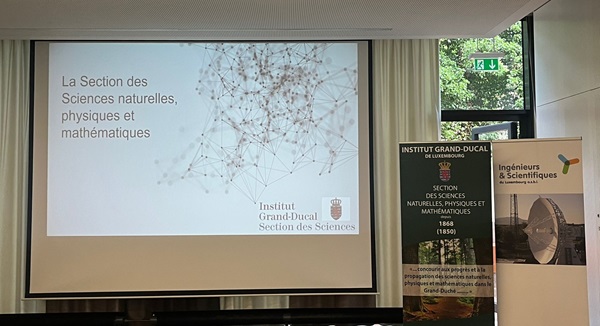 Credit: Yevgenia Doluda, Chronicle.lu
Credit: Yevgenia Doluda, Chronicle.lu
On Thursday 27 June 2024, the Luxembourg Institute of Science and Technology (LIST) and the science department of Institut Grand-Ducal hosted their sixth and final conference regarding possible adaptation and mitigation measures at the Forum Da Vinci in Luxembourg City.
The presentation emphasised the severe climate changes visible throughout Luxembourg's biodiversity, such as the rise of air temperature levels and irregular precipitation. It also noted the severe effects of natural disasters like floods and forest fires. However, the conference primarily focused on innovative solutions that can be implemented throughout various sectors to combat climate change and allow Luxembourg to become a sustainable society. Representatives from diverse areas of expertise spoke about their projects and what measures must be undertaken to deal with climate change.
Martin Biehler, an expert from TR-Engineering, spoke about Luxembourg's issue with heavy rains and flooding by showing videos and maps of the flooding zones. He pointed out that adequate measures in housing construction and street (re)planning are possible solutions to conbat devastation caused by extreme weather conditions throughout Luxembourg.
Next, Philippe Genot, Chief Innovation Officer at Schroeder & Associés, presented a pilot project for a crèche in the municipality of Betzdorf. The architectural design of the building is meant to reflect biodiversity and sustainability taught to young children. The project also addresses the issue of natural resources, aiming to use wood from the municipal forest in a sustainable and regenerative manner. The project is an example of a local effort to adopt measures to undertake climate change.
Bruno Alves from the Ministry of the Environment, Climate and Biodiversity, talked about the difference between mitigation and adaptation measures. He outlined the government's efforts to adequately assess and act upon necessary aspects of sustainability in Luxembourg. Most importantly, he pointed out the obligation of local communities to contribute to these efforts.
Lastly, Andrew Ferron, President of Observatoire de la Politique Climatique Luxembourg, presented the group's efforts in collecting necessary data to appropriately advise the government in the implementation of adaptive measures. He said that technological and behavioural changes are needed, as well as a national policy redesign.
The conference was concluded by a brief opportunity for questions and further discussion with the speakers.








